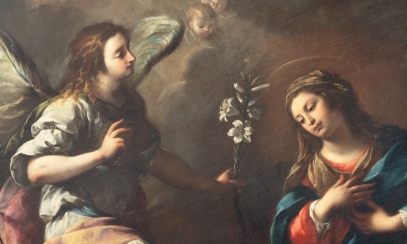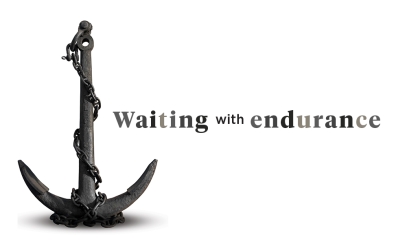
Bishop’s Year of the Bible
Bishop Boyea invites us to enter into a closer relationship with the Lord through hearing him in the words of Scripture. We are encouraged to read a chapter of the Bible each day and reflect on it together with our fellow pilgrims in the diocese. The following reflection from the bishop covers the chapters we’ll be reading in June and the early part of July.
May 27-July 15
THE BOOK OF GENESIS
As we begin this time after the great feast of Pentecost, a time we call Ordinary Time, I invite you to join me in reading through the very first book of the Bible, the Book of Genesis.
This book was written by many different hands over many centuries and long after the events being described. These authors used traditions from their own Jewish heritage as well as accounts from the general Mesopotamian region. They presented as their cultural history what we would challenge today with our more scientific understanding of history. There are many things that today we might find objectionable: creation in seven days, the violence of some of the patriarchs, the violence of God and other cultural practices.
Especially regarding certain actions that we find reprehensible, we must remember that, at the time, everything was seen to be an act of God. In a sense, there is truth to this as we understand the difference between God’s positive will and his permissive will. God positively wills the good, the true and the beautiful. God may permit other things to happen but only because he knows that he can draw great good from them. The climax of that approach is found in his Son’s death on the cross, which won our salvation.
Yet, this is the word of God, inspired not so much to be a series of facts but as an account of God’s salvation of humanity. We must start from the aim of the original authors. It was to show the difference between One God and the many gods in the cultures around these authors. This One God is unchallenged and unmatched and, therefore, makes everything, and everything he makes is good. Humanity is one and good and in God’s image, yet we bring sin into this world. And ever after, God is calling us back to himself, a program of fits and starts that is only fulfilled in Jesus Christ.
There are four major sections to this book: the origin accounts of humanity in Chapters 1 through 11; the call and covenant with Abraham, the Father in Faith of Israel (Chapters 12 through 25); Jacob and his sons (Chapters 25 through 36); and, finally, Joseph and his brothers and the move to Egypt (Chapters 27 through 50). This ending provides the setting for the account of Moses and the formation of the people of Israel in the Book of Exodus.
As we read and meditate on these various chapters, let us imitate our Father in Faith, Abraham. Let us be at God’s beck and call, willing to do God’s will because we know he is supreme and good and loving. We can do no better than to follow him.
Sharing in the Priesthood of Christ
By Tim Carpenter, Director of Religious Education
“The lay apostolate, however, is a participation in the salvific mission of the Church itself.” (Lumen Gentium, 33)
Jesus initiated the Church for the purpose of continuing his mission. Each member of the Church is commissioned into that mission when they are baptized. From the Second Vatican Council, the Church articulated beautifully our roles as priest, prophet and king. (Lumen Gentium 2, 40) Today we will look at how we share in Christ’s role as priest and how active reading of Scripture can help us live that out.
First of all, what is a priest? A priest is one who offers sacrifice to God. It is clear that Jesus is the High Priest who offers to the Father the one, true sacrifice for all of mankind. So then, how do we share in that? Lumen Gentium 34 proclaims, “He also gives them a sharing in His priestly function of offering spiritual worship for the glory of God and the salvation of men.” That definition begs the question, what “spiritual worship” did Jesus offer to the Father? The most essential elements of Jesus’ teaching and ministry are those that motivate his every word and action: listening to the Father and doing the Father’s will.
The commitment to these two actions shapes everything that Jesus does, including his action as priest, prophet and king. That means it is the Father who leads him to his preaching, teaching, suffering and his death. They are, for him and for us, the very essence of holiness. He is holy. We are destined to be and become holy as we follow Jesus in this way. On the flip side is sin, the refusal to hear the Father’s word or to do his will.
Jesus heard directly from the Father. We, too, can hear directly from the Father. One way is through the Scriptures. The Church proclaims that the privileged place for hearing the Scriptures is in the liturgy. It also emphasizes the importance and benefit of interacting with the living word of God on our own, the reading and listening to the word in personal prayer. Pope Benedict XVI states in Verbum Domini 86, “In some sense the prayerful reading of the Bible, personal and communal, must always be related to the eucharistic celebration.”
If the liturgy is the privileged place for Scripture, this means that they are being proclaimed publicly for all to hear. This is telling. “Hearing” the word implies submission. It means that one has quieted oneself and is listening for God’s voice. It implies receiving the word that God is speaking through the Scriptures. This is essential to living as priests.
There is a deep connection between hearing the word of God in the liturgy and our participation in the Eucharist. As we share in Christ’s priesthood, we share in offering to the Father the one true sacrifice that atones for our sins. As priests, we can add to that gift our own gift of self. As complex human beings with layers of sins, wounds and imperfections, we have much to offer God. How do we sift through it all? The Church is telling us that when we listen to the Scriptures, we are being oriented toward our participation as a priest in the sacrifice of the Mass. Let the Father, through the Scriptures, guide us in this offering. Let him shape the gift we offer back to him, the wounds, imperfections and sins that he knows need the most attention.
Engaging with the Scriptures in our personal prayer time should increase our sensitivity to God’s voice, (“For my sheep know my voice”) so that, at Mass, we listen more easily and hear more clearly God’s guidance in shaping our hearts as we offer to him our spiritual worship, both for his glory and for the salvation of men.
Consecrate yourself to Jesus through Mary
By Richard Budd, Director of the Office of Marriage and Family
During Bishop’s Year of the Bible, we’re exploring various ways of praying with Scripture. In May, which is typically the month dedicated to Our Lady, we are going to take a deeper look at Marian Consecration.
What is Marian Consecration?
The Catechism of the Catholic Church defines a consecration as “The dedication of a thing or person to divine service by a prayer or blessing.” We entrust ourselves, all that we have and all that we do, to the protection, love and intercession of Mary.
This idea is deeply rooted in Scripture. In fact, the first persons to entrust themselves to Mary were the three persons of the Blessed Trinity. In Luke 1:34 we have the words of the Archangel Gabriel to Mary, “The Holy Spirit will come upon you, and the power of the Most High will overshadow you; therefore the child to be born will be called holy, the Son of God”; each person, Father, Son and Holy Spirit, entrusts themselves to her. Later on, in the Gospel of John, our Lord, from his cross, entrusts his Beloved Disciple to his mother Mary to be his own mother. From that hour, “the disciple took her to his own home.” (Jn 19:27)
Why should I consecrate myself to Mary?
So, one may ask, “Shouldn’t we instead consecrate ourselves to Jesus, if this, as the catechism says, is about dedication to divine service? Mary isn’t divine.” This is a very good question and deserves a good answer. Marian consecration is a consecration to Jesus; however, it is a consecration that is done through Mary.
If you think about it, this is an entirely appropriate way to encounter our Lord. In fact, it is the way he established from the beginning. It is through Mary that he came into the world in the first place. In addition, our Lord did not discard Mary after she gave birth; she was an intimate member of his disciples; one of the few at the foot of the cross, she received the Beloved Disciple as her own son and was present on Pentecost morning when the Holy Spirit descended upon the Apostles, activating them to bring Christ to the world. As her words to the workers at the Wedding Feast of Cana reveal, Mary is always directing us toward her son and instructing us to “do whatever he tells you.” (Jn 2:5)
So why consecrate yourself to Jesus through Mary? Because she’s a good mother who wants you to love our Lord. She wants us to be in heaven for all eternity, and so she stands as a gracious intercessor on our behalf. She takes all of our feeble efforts at a good life, adds her motherly care and attention and then presents us to her son. She helps us grow into better disciples of Jesus. Many saints have found Marian consecration to be a key to their personal holiness, especially saints such as Maximillian Kolbe, who was martyred by Nazis, and St. John Paul II, who chose his papal motto from his consecration.
OK, you’ve convinced me. How do I consecrate myself to Jesus through Mary?
First, it is customary to make this consecration on a Marian feast day. There are many all throughout the year, so choose one to be your day of consecration. Next, it is typical to do a time of preparation beforehand. The preparation usually lasts 33 days and ends the day before the feast. For that time of preparation, it is helpful to have a guide along the way. You could go old-school and get the method called Preparation for Total Consecration, by St. Louis de Montfort, or use a recent version, 33 Days to Morning Glory, by Fr. Michael Gaitley. There is no wrong or right here – find a method of consecration that suits you.
In the end, we’re all trying to know, love and serve Jesus as best we can. Mary can certainly help us because she was his mom, and, other than God the Father and the Holy Spirit, she knows Jesus better than anyone. Who better than her to help us along the way?



